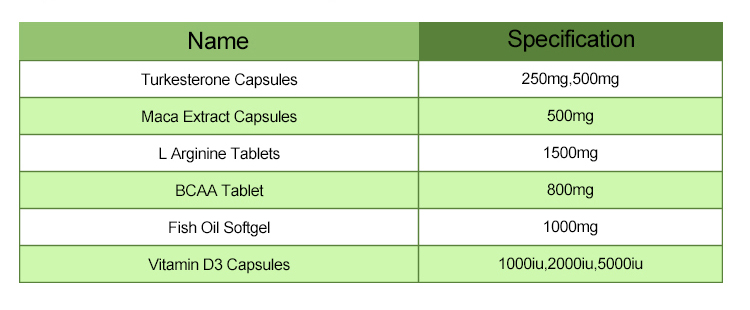BCAA Tablet is made of top quality BCAA. Branch Chain Amino Acids (BCAAs) are a group of three essential amino acids: leucine, isoleucine, and valine. These amino acids are termed “essential” because the body cannot produce them on its own, so they must be obtained through diet or supplementation. BCAAs play a crucial role in muscle protein synthesis and energy production, particularly during exercise and periods of stress on the body.
BCAA tablets are a popular form of BCAA supplementation. They are convenient and easy to consume, making them a preferred choice for athletes, bodybuilders, and individuals looking to support muscle recovery and growth. Here’s a comprehensive overview of BCAA tablets, including their benefits, potential side effects, dosage, and considerations:
- Benefits:
Muscle Growth and Repair: BCAAs, especially leucine, stimulate muscle protein synthesis, promoting muscle growth and repair.
Exercise Performance: BCAAs can help reduce fatigue during exercise by providing an alternative energy source for muscles, particularly during prolonged or intense workouts.

Muscle Sparing: BCAAs may help preserve muscle mass during periods of calorie restriction or intense training, preventing muscle breakdown.
Recovery: BCAAs can aid in post-exercise recovery by reducing muscle soreness and promoting faster repair of damaged muscle tissue.
- Dosage:
The optimal dosage of BCAA tablets can vary based on individual factors such as body weight, exercise intensity, and fitness goals.
A common dosage range for BCAA supplementation is 5-20 grams per day, typically divided into multiple doses taken before, during, and after exercise.
It’s essential to follow the dosage recommendations provided by the manufacturer or consult with a healthcare professional to determine the appropriate dosage for your specific needs.
- Side Effects:
BCAA supplementation is generally considered safe when taken within recommended dosage guidelines.
Some individuals may experience minor side effects such as nausea, stomach discomfort, or headaches, especially when consuming high doses.
People with certain medical conditions, such as maple syrup urine disease or ALS (amyotrophic lateral sclerosis), should avoid BCAA supplementation or consult with a healthcare professional before use.
- Considerations:
Quality: Choose BCAA tablets from reputable brands that undergo third-party testing for purity and potency to ensure product quality and safety.
Ingredients: Check the ingredient list for additional additives or fillers, and opt for products with minimal additives or allergens if necessary.

Timing: BCAA tablets are commonly taken before, during, or after exercise to support performance and recovery. However, timing may vary based on individual preferences and goals.
Combination with other supplements: BCAAs are often combined with other supplements such as whey protein, creatine, or carbohydrate supplements to enhance their effects on muscle growth, recovery, and performance.
In conclusion, BCAA tablets offer a convenient and effective way to supplement with essential amino acids that play a vital role in muscle growth, recovery, and exercise performance. When used appropriately and in conjunction with a balanced diet and regular exercise, BCAA tablets can support overall health and fitness goals. However, it’s essential to consult with a healthcare professional before starting any new supplementation regimen, especially if you have underlying health conditions or concerns.
